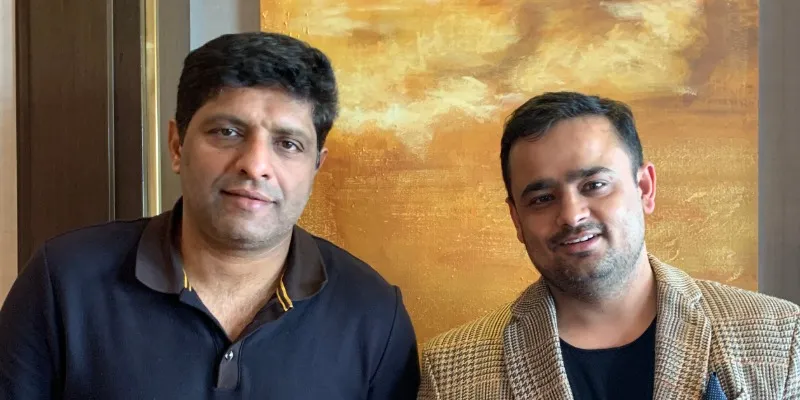How Truck and Mortar aims to drive the future of apparel retail with fashion trucks
In 2015, Ankit Shukla and Roopika Srivastava launched fashion brands Adamo and Evah under Concord Ventures Group. Now, with investor Shridhar Sarma, they are rolling out Truck and Mortar fashion trucks that will take luxury brands to 100-plus cities.
Move over, food trucks! India’s first fashion truck is set to get on road, courtesy Bengaluru-based Concord Ventures Group.
After offering two successful brands – Adamo London and Evah London – under the English Closet umbrella, Ankit Shukla and Roopika Srivastava have now launched Truck and Mortar, which will roll out fashion trucks that could put brick-and-mortar stores in the shade and revolutionise fashion retail in India.

Founders Sridhar and Ankit
The pilot of the first fashion truck is under way in Bengaluru, and it promises an unparalleled shopping experience. The 15-ton truck is kitted out with an AC store complete with bright signage, changing rooms, and a cash till, and will stock Adamo and Evah apparel along with other top brands. And, drive into locations near you! What’s not to like?
Donning the entrepreneurial hat
Ankit and Roopali worked in in various design houses and with apparel manufacturers for almost two decades before they decided to launch their own venture in 2015.
“After more than a decade of working in design and buying houses, managing the global supply chain and sourcing, I realised I could start up. I wondered why not create a luxury brand for Indian buyers at an affordable cost. My wife, Roopika, and I quit our jobs and started this venture,” says Ankit Shukla, Co-founder of Adamo London, Evah London, and Truck and Mortar.
Over the last four years scaled the company from concept to a global online brand with $4.3 million in total revenues.
Ankit, the CEO, holds full P&L strategic responsibilities; Roopika is the creative director of the company.
The duo led customer acquisition efforts by implementing business alliances and partnerships with ecommerce partners such as Amazon and , bloggers, fashion stylists, and through online advertising campaigns.
“We understood the product mix and what would sell online. We knew the pricing had to be just right and not discounted like mass brands,’’ Ankit says.
Apparel from the Adamo and Evah brands retails at Rs 2,000-plus.
The company has, since inception, achieved YOY revenue growth of 50 percent by optimising the product mix based on seasonality and consumer cohorts. The founders created a model to improve inventory purchasing decisions, which decreased total out-of-season excess inventory by 35 percent. This is very important in retail because excess inventory means cash stuck in managing the warehouse and can quickly spiral to a loss.
In the first year, the duo drove collaborative processes for creating the annual operating plan (including budget) resulting in increased performance, transparency, and operational effectiveness.
They also established and administered the annual budget with tight control on what was manufactured to prevent line losses, minimised the supply chain burn rate, and supported sustainability objectives.
Their efforts have paid off. The company has, since inception, achieved year-on-year revenue growth of 50 percent by optimising the product mix, based on seasonality and consumer cohorts.
The company’s first ecommerce partner was koovs.com; this partnership[ helped the brands make Rs 1 crore in the first year and brought in Rs 4.5 crore investment from Shridhar Sarma, an apparel manufacturer and investor based in Dubai, in 2015. Shridhar owns Concord and funded Adamo and Evah.
However, the ecommerce journey was not enough. The trio had to go offline for bigger scale.
The birth of Truck and Mortar
Last year, the founders found that they had enough cash in hand to open two or three stores, but realised that the cost of running a store would be exorbitant.
In early 2019, they decided to instead opt for a new-age retail solution: a fashion truck.
Physical stores necessitate high investment and fixed monthly expenses. They need long-term commitment requirements, and there is a risk of not achieving minimum sales to cover expenses. Financial and logistical challenges of operating at multiple locations also come into play.
“There are also challenges of getting desired space in premium malls and high street locations; they have very few walk-ins over the weekdays. The solution was to launch our own ecommerce channel along with this mobile truck,’’ Ankit says.
Fashion trucks, on the other hand, are becoming popular in many countries as they lead to a significant reduction in investment, offer freedom of choice and flexible hours, and can reach customers where they are.
How Truck and Mortar works
The new platform aims to change how people shop, by bringing the store closer to them. The trucks, which will be open to other brands, will mean that fashion houses no longer have to spend huge money on store rent, deposits, interiors, long-term commitments, and other fixed expenses.
This startup aims to offer fully equipped trucks that will function like mobile retail stores for offline sales. The vehicles, equipped with technology-driven marketing tools, will let shoppers try garments, buy, and explore more options in the online store (accessible from the truck as well).
The fashion trucks will be parked near colleges during mornings, in the proximity of IT parks and offices during afternoons, and at malls during weekends. The trucks can also be taken to events, residential communities, and more.
“Brands just need to provide their latest range, and we will take care of rest. They can also hire it for a day, week, or month,’’ Ankit says.
Brands can also run their logo and branding on the truck along with the Truck and Mortar branding on the days they hire the truck. The truck thus functions as a mobile brand marketing tool.
“They can be registered as a marketplace brand on our online platform. So, they can sell on our platform online and hire the truck for offline sales. Our platform will also reveal a truck’s movement calendar and available slots,” Ankit says.
This model will provide small online brands to have a physical store presence in premium malls and other places. Brands that have stores can use the platform to increase weekday sales. Bigger international brands that do not have a presence in Tier II and III cities can test the market.
“We can provide them a wider reach with this platform and service. Customers can also put in requests to call their favourite brands to their residential complexes, colleges or offices,” Ankit says.
The company is piloting this concept in Bengaluru, and aims to expand to 100-plus cities by 2021. Truck and Mortar competes with online brands of Myntra at one end and marquee brands like Calvin Klein and Ralph Lauren on the other.
“We want to be a $10 million company in three years along with Adamo London and Evah London,” Ankit says.
(Edited by Teja Lele Desai)










